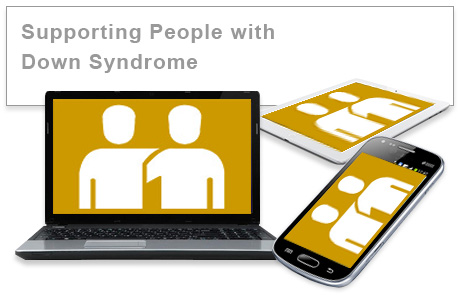supporting-people-down-syndrome-f
Supporting People with Down Syndrome (F): e-learning training course

This e-learning course entitled Supporting People with Down Syndrome is broken down into four easy-to-follow units - an introduction and three study units. It explores what Down Syndrome means to the people who have the condition and includes a series of interviews with Marianne and Lois, who explain how it feels and the impact it has on their lives.
Gaining a better understanding of the condition will help learners to provide people with the help and support they need.
Unit 2 examines what Down Syndrome means to the people who have the condition - how it feels and the impact it has. This unit enables learners to understand the condition so that they can start to appreciate what people need in terms of support. The unit looks at the ways in which Down Syndrome can affect people's everyday lives, in terms of their ability to communicate, their health and the threats they can face from the society they live in.
Unit 3 identifies and dispels some of the myths that exist about people with Down Syndrome. It also defines person-centred support and explains why this is the best approach to take. It then goes on to describe 'circles of support' and how these can be
used to assess a person's current support provision and highlight any shortfalls. At the
end of the unit, learners will learn about time banks and about how they can be a useful
resource for people with Down Syndrome.
Unit 4 introduces learners to person-centred planning, a forward-thinking and widely used system for helping people with disabilities get the most out of their lives. The unit also looks at ways of helping people with Down Syndrome to communicate more easily and make important decisions. In this unit, learners will look at important issues such as dementia as well as more positive ones like helping people with Down Syndrome to find work.
The objectives for each study unit are that learners will be able to:
- list the main things that people with Down Syndrome want and need from their support networks
- identify the skills required to support someone with Down Syndrome effectively
- describe the impacts of Down Syndrome and the difficulties that can arise
- recognise when someone is a victim of hate crime and take appropriate steps to prevent it
- explain how support workers can make things easier for people with Down Syndrome
- differentiate between fact and fiction in relation to some preconceived ideas about people with Down Syndrome
- describe what a person-centred approach to support is
- explain what 'circles of support' are and how they can be used to assess a person's needs
- list the purpose of time banks and identify how they can be beneficial to many people with Down Syndrome
- describe how best to help people with Down Syndrome to communicate effectively and make important decisions
- explain how person-centred planning can benefit people they support
- identify the purpose of health action plans
- suggest ways of helping people to integrate and succeed in finding work.
Copyright Notice | Terms and Conditions | Privacy Statement | Disclaimer |
Copyright © 2006 - 2024 Embrace Learning Ltd.